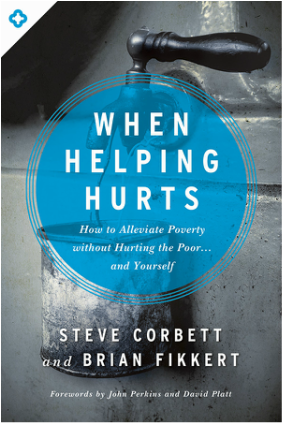
I am currently reading one of the most painful books ever written. The pain doesn't come from the arduous task of reading boring text, but rather from the wedging in of a truth to my life that I, my society, and Westernized Christianity have attempted to repel for nearly a century.
When Helping Hurts has thrown more conviction and revelation my way in the first chapter than any book in my recollection. I'd like to lay that out in this post for others to see, but also for my reference - on those days when I need to remember what it's all about.
Israel's Captivity Largely Resulted from Social Injustice: While idols and false gods were certainly in Israel's sinful repertoire, God was particularly displeased with Israel's lack of social justice towards the oppressed, fatherless, widow, and poor. (Micah 6:8, Isaiah 1:10-17 and Isaiah 58:1-10)
The First Passage About the Gathering of the Church Centered Around Social Justice: "There was no needy person among them." (Acts 4:34). The New Testament is filled with passages on social justice, (Mt. 25:31-46, Acts 6:1-7, Gal. 2:1-10, James 1:27, I Jn. 3:16-18, and many others). Christianity took social justice so seriously, even pagan kings took note: "The impious [Christians] support not only their poor, but ours as well, everyone can see that our people lack aid from us." (Emperor Julian)
Western Christians Used to Care About Social Justice: Church historians call the era from 1900-1930 the "Great Reversal." Corbett and Fikkert explain that "as evangelicals tried to distance themselves from the social gospel movement, they ended up in large-scale retreat from the front lines of poverty alleviation." This was largely due to an association of new secular humanitarian efforts with liberal theology. Note that the withdrawal of the church from poverty alleviation resulted in the "New Deal" within just one generation, and the "War on Poverty" within two generations. Government did not push the church out, rather the church withdrew and left a vacuum that someone had to fill.
And that brings us back to the initial quote. What have I learned or of what have I been reminded from chapter one of "When Helping Hurts?" Christ's work is much more than the message of the gospel unto salvation; it is also the message and pursuit of the restoration and redemption of the world, where all things are made right. God takes social justice seriously - even more seriously than the little sacrifices of piousness I think I offer up every Sunday. My life and ministry needs to reflect true love, which, as John points out, is having tangible pity for those in need. So for as much as Catalina and I love the fostering of the mind, we will do well to remember that worship is done not only in truth, and not only in spirit, but also in the flesh. While the gnostics may not like such a message, Jesus embodies it.



 RSS Feed
RSS Feed